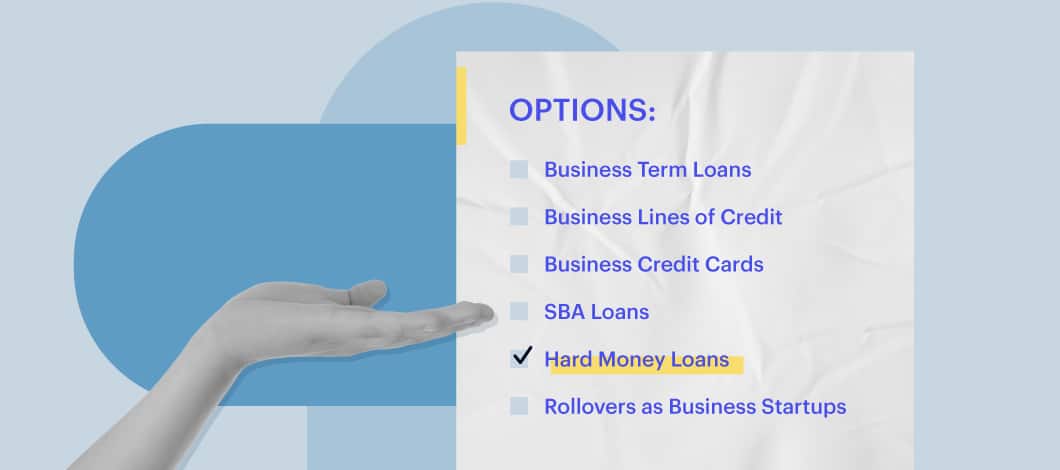Where can you find loans for real-estate agents? Here are 6 financing options for those in the real-estate business.
Learn about:
- Business term loans
- Business lines of credit
- Business credit cards
- Small Business Association (SBA) loans
- Hard money loans
- Rollovers as business startups
Small Business Loans for Real-Estate Agents
Financing available to real-estate agents includes business term loans and SBA loans.
Other funding options include business lines of credit and credit cards. Additionally, real-estate agents can draw on unconventional options such as hard money loans and rollovers as business startups.
Option 1: Business Term Loans
Can real-estate agents and Realtors get small business loans? The answer is a resounding “yes.” Term loans are a major source of small business loans for Realtors and real-estate agents. As the name implies, term loans have a specified repayment term.
Term loans fall into 3 main categories based on term length:
- Short-term loans with repayment terms of 1 year or less
- Intermediate-term loans with terms of 1 year to 3 years
- Long-term loans with terms of 3 years or more
In addition to term length, these loan types typically vary in other respects:
- Short-term loans involve lower amounts than intermediate-term and long-term loans
- Short-term loans charge higher interest rates than longer-term loans
- Short term loans require less time in business, less annual revenue and lower credit scores to qualify than longer-term loans
Take Note
Specific amounts, rates and qualifications will vary by lender. In general, to qualify for loans with longer terms or better rates, your chances improve:
- The longer you’ve been in business (more than 1 year)
- Your annual revenue exceeds $100,000
- Your credit score is at 600 or higher
Some alternative online lenders are willing to relax credit score requirements if you can document sufficient annual revenue.
Option 2: Business Lines of Credit
Real-estate agents aren’t limited to loans for financing. Working capital for real-estate companies can be obtained through business lines of credit.
What’s a Business Line of Credit?
A business line of credit allows you to borrow money from an account up to a set limit. Money you borrow gets deposited into a bank account, where you can spend it as you wish. After you repay what you borrow, you can normally spend it again, up to your designated limit, although not all lines of credit offer this feature. Lines of credit where you can spend money again after repaying it also are called “revolving” lines of credit.
Business lines of credit are normally unsecured, meaning they don’t require collateral. Using a lien on your assets or certificate of deposit of collateral can allow you to access a higher credit limit. Unsecured lines of credit typically come with lower limits. Lines of credit normally offer lower interest rates than credit cards.
Financial providers typically require a minimum time in business, monthly revenue level personal and business credit score to qualify for a line of credit. If you have a low credit score, you may be able to obtain a secured line of credit by offering collateral.
Option 3: Business Credit Cards
Business credit cards work similarly to revolving business lines of credit. You can spend up to a set limit. After you repay what you spend, you can spend it again.
However, unlike a line of credit, where money gets deposited into a bank account, money you spend with a business credit card typically goes toward sellers you use. Alternately, you can withdraw a cash advance for a higher interest rate than your normal purchases, plus an additional fee. Business credit cards usually have lower limits than lines of credit. They typically carry higher interest rates than business lines of credit. Rates are higher for cash advances.
Business credit cards generally have lower qualification thresholds than lines of credit, with your credit score playing a major role. Both your personal and your business credit score may be considered. If you’re a new company owner without a business credit history, financial providers will focus on your personal credit score. If you’ve been in business for a while, providers will look at your business credit score, which can be affected by items such as your record of paying your suppliers on time.
Option 4: SBA Loans
Another source of small business loans for real-estate agents is SBA loans. These loans are backed by the SBA and extended through a network of approved lenders. In return for SBA guarantees, these lenders must keep their rates below a regulatory cap, making SBA loans one of the most cost-efficient types of financing available.
The SBA’s loan program includes a variety of options that can be useful to real-estate businesses, including two that are particularly useful:
- SBA 7(a) loans
- SBA CDC/504 loans
7(a) loans are all-purpose business loans that may be used for general purposes, including working capital, debt refinancing and noninvestment real-estate purchases. Borrowers can receive loans of up to $5 million under this program.
CDC/504 loans are jointly backed by the SBA and Certified Development Companies (CDCs), which are typically nonprofit corporations dedicated to community development. They can be used for the purchase of land and buildings, the construction of facilities, property improvements and the acquisition of long-term equipment and machinery. The 504 portion of the loan can be as much as $5 million.
Borrowers must have first failed to secure funding from other financing sources, including personal finances. For 7(a) loans, you must meet credit score minimums acceptable to your lender, submit a personal financial statement and provide 3 years of business financial statements. You must make a down payment of at least 10%. Your lender may require you to meet other requirements beyond these minimum requirements.
For CDC/504 loans, the project assets being financed serve as collateral. Principal owners of the borrowing business must also back the loan with a personal guarantee.
Option 5: Hard Money Loans
For companies involved in real-estate development and property flipping, another financing option is a hard money loan, also known as an equity-based loan. With this type of funding, the amount you borrow gets secured by the property you’re using the money to finance. If you default on your payments, the lender can seize your property as collateral.
Hard money loans represent a high risk for lenders. Selling a property if a borrower defaults can be difficult and expensive, giving lenders no guarantee of recovering their money. Because of this risk, hard money loans carry high interest rates.
The main qualifying criterion for this kind of financing? The amount of the loan must not exceed a certain percentage of the value of the property serving as collateral. This percentage is known as the loan-to-value ratio (LTV). Lenders generally prefer that LTV not exceed 50% to 70%, according to Investopedia and other finance-related websites.
Option 6: Rollovers as Business Startups
If you don’t qualify for other forms of financing and you have a retirement account such as 401(k) or Individual Retirement Account (IRA), you may be able to finance your business through a rollover as business startup (ROBS) arrangement. Under this arrangement, negotiated through an attorney or a ROBS provider, money from your retirement account finances your business through this series of steps:
- A C corporation, a corporate structure that allows for stockholders, is created
- A new 401(k) plan for this corporation is created
- Your existing retirement accounts get rolled over into the new 401(k) plan
- Rolled-over funds are used to purchase stock in the C corporation
- Proceeds from the sale of the stock get invested in your business
With ROBS financing, you’re using your own money, so you don’t incur the same type of debt you would with conventional loans. However, you’re putting your retirement savings at risk, and you’ll pay a significant fee to your ROBS provider or attorney.
Note the Internal Revenue Service has some concerns regarding ROBS arrangements. It’s crucial to do your due diligence before entering into an agreement.
Choosing the Right Funding for Real-Estate Agents
Now that you know some of your options, how do you go about choosing the right one?
You can narrow your search down to others by asking some relevant questions:
- How much funding do you need?
- What do you need financing for?
- How soon do you need financing?
- Is your credit score high enough to qualify for term loans, business credit lines or business credit cards?
- Have you been in business long enough to qualify for a term loan?
- Is your revenue high enough to qualify for a term loan?
- Have you been turned down for a term loan, business credit line or business credit card?
- How much could you afford as a down payment as an SBA loan?
- What type of collateral do you have for a hard money loan?
- Do you have a 401(k), IRA or other retirement fund to draw from for ROBS financing?
Working through these questions will help you determine which forms of financing you may qualify for, which you don’t and which available options best suit your needs. As a general rule of thumb, if you can qualify for a term loan, business line of credit or business credit card, seek these options first before pursuing other alternatives.
For smaller expenses, business lines of credit and business credit cards may be more suitable than loans.












